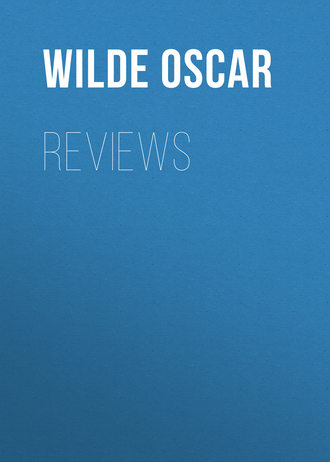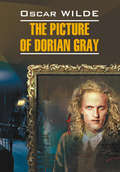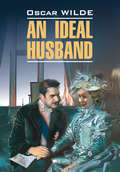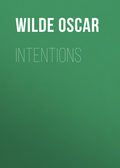
Оскар Уайльд
Reviews
MINER AND MINOR POETS
(Pall Mall Gazette, February 1, 1887.)
The conditions that precede artistic production are so constantly treated as qualities of the work of art itself that one sometimes is tempted to wish that all art were anonymous. Yet there are certain forms of art so individual in their utterance, so purely personal in their expression, that for a full appreciation of their style and manner some knowledge of the artist’s life is necessary. To this class belongs Mr. Skipsey’s Carols from the Coal-Fields, a volume of intense human interest and high literary merit, and we are consequently glad to see that Dr. Spence Watson has added a short biography of his friend to his friend’s poems, for the life and the literature are too indissolubly wedded ever really to be separated. Joseph Skipsey, Dr. Watson tells us, was sent into the coal pits at Percy Main, near North Shields, when he was seven years of age. Young as he was he had to work from twelve to sixteen hours in the day, generally in the pitch dark, and in the dreary winter months he saw the sun only upon Sundays. When he went to work he had learned the alphabet and to put words of two letters together, but he was really his own schoolmaster, and ‘taught himself to write, for example, by copying the letters from printed bills or notices, when he could get a candle end, – his paper being the trapdoor, which it was his duty to open and shut as the wagons passed through, and his pen a piece of chalk.’ The first book he really read was the Bible, and not content with reading it, he learned by heart the chapters which specially pleased him. When sixteen years old he was presented with a copy of Lindley Murray’s Grammar, by the aid of which he gained some knowledge of the structural rules of English. He had already become acquainted with Paradise Lost, and was another proof of Matthew Prior’s axiom, ‘Who often reads will sometimes want to write,’ for he had begun to write verse when only ‘a bonnie pit lad.’ For more than forty years of his life he laboured in ‘the coal-dark underground,’ and is now the caretaker of a Board-school in Newcastle-upon-Tyne. As for the qualities of his poetry, they are its directness and its natural grace. He has an intellectual as well as a metrical affinity with Blake, and possesses something of Blake’s marvellous power of making simple things seem strange to us, and strange things seem simple. How delightful, for instance, is this little poem:
‘Get up!’ the caller calls, ‘Get up!’
And in the dead of night,
To win the bairns their bite and sup,
I rise a weary wight.
My flannel dudden donn’d, thrice o’er
My birds are kiss’d, and then
I with a whistle shut the door
I may not ope again.
How exquisite and fanciful this stray lyric:
The wind comes from the west to-night;
So sweetly down the lane he bloweth
Upon my lips, with pure delight
From head to foot my body gloweth.
Where did the wind, the magic find
To charm me thus? say, heart that knoweth!
‘Within a rose on which he blows
Before upon thy lips he bloweth!’
We admit that Mr. Skipsey’s work is extremely unequal, but when it is at its best it is full of sweetness and strength; and though he has carefully studied the artistic capabilities of language, he never makes his form formal by over-polishing. Beauty with him seems to be an unconscious result rather than a conscious aim; his style has all the delicate charm of chance. We have already pointed out his affinity to Blake, but with Burns also he may be said to have a spiritual kinship, and in the songs of the Northumbrian miner we meet with something of the Ayrshire peasant’s wild gaiety and mad humour. He gives himself up freely to his impressions, and there is a fine, careless rapture in his laughter. The whole book deserves to be read, and much of it deserves to be loved. Mr. Skipsey can find music for every mood, whether he is dealing with the real experiences of the pitman or with the imaginative experiences of the poet, and his verse has a rich vitality about it. In these latter days of shallow rhymes it is pleasant to come across some one to whom poetry is a passion not a profession.
Mr. F. B. Doveton belongs to a different school. In his amazing versatility he reminds us of the gentleman who wrote the immortal handbills for Mrs. Jarley, for his subjects range from Dr. Carter Moffatt and the Ammoniaphone to Mr. Whiteley, Lady Bicyclists, and the Immortality of the Soul. His verses in praise of Zoedone are a fine example of didactic poetry, his elegy on the death of Jumbo is quite up to the level of the subject, and the stanzas on a watering-place,
Who of its merits can e’er think meanly?
Scattering ozone to all the land!
are well worthy of a place in any shilling guidebook. Mr. Doveton divides his poems into grave and gay, but we like him least when he is amusing, for in his merriment there is but little melody, and he makes his muse grin through a horse-collar. When he is serious he is much better, and his descriptive poems show that he has completely mastered the most approved poetical phraseology. Our old friend Boreas is as ‘burly’ as ever, ‘zephyrs’ are consistently ‘amorous,’ and ‘the welkin rings’ upon the smallest provocation; birds are ‘the feathered host’ or ‘the sylvan throng,’ the wind ‘wantons o’er the lea,’ ‘vernal gales’ murmur to ‘crystal rills,’ and Lemprière’s Dictionary supplies the Latin names for the sun and the moon. Armed with these daring and novel expressions Mr. Doveton indulges in fierce moods of nature-worship, and botanises recklessly through the provinces. Now and then, however, we come across some pleasing passages. Mr. Doveton apparently is an enthusiastic fisherman, and sings merrily of the ‘enchanting grayling’ and the ‘crimson and gold trout’ that rise to the crafty angler’s ‘feathered wile.’ Still, we fear that he will never produce any real good work till he has made up his mind whether destiny intends him for a poet or for an advertising agent, and we venture to hope that should he ever publish another volume he will find some other rhyme to ‘vision’ than ‘Elysian,’ a dissonance that occurs five times in this well-meaning but tedious volume.
As for Mr. Ashby-Sterry, those who object to the nude in art should at once read his lays of The Lazy Minstrel and be converted, for over these poems the milliner, not the muse, presides, and the result is a little alarming. As the Chelsea sage investigated the philosophy of clothes, so Mr. Ashby-Sterry has set himself to discover the poetry of petticoats, and seems to find much consolation in the thought that, though art is long, skirts are worn short. He is the only pedlar who has climbed Parnassus since Autolycus sang of
Lawn as white as driven snow,
‘Cypress black as e’er was crow,
and his details are as amazing as his diminutives. He is capable of penning a canto to a crinoline, and has a pathetic monody on a mackintosh. He sings of pretty puckers and pliant pleats, and is eloquent on frills, frocks and chemisettes. The latest French fashions stir him to a fine frenzy, and the sight of a pair of Balmoral boots thrills him with absolute ecstasy. He writes rondels on ribbons, lyrics on linen and lace, and his most ambitious ode is addressed to a Tomboy in Trouserettes! Yet his verse is often dainty and delicate, and many of his poems are full of sweet and pretty conceits. Indeed, of the Thames at summer time he writes so charmingly, and with such felicitous grace of epithet, that we cannot but regret that he has chosen to make himself the Poet of Petticoats and the Troubadour of Trouserettes.
(1) Carols from the Coal-Fields, and Other Songs and Ballads. By Joseph Skipsey. (Walter Scott.)
(2) Sketches in Prose and Verse. By F. B. Doveton. (Sampson Low, Marston and Co.)
(3) The Lazy Minstrel. By J. Ashby-Sterry. (Fisher Unwin.)
A NEW CALENDAR
(Pall Mall Gazette, February 17, 1887.)
Most modern calendars mar the sweet simplicity of our lives by reminding us that each day that passes is the anniversary of some perfectly uninteresting event. Their compilers display a degraded passion for chronicling small beer, and rake out the dust-heap of history in an ardent search after rubbish. Mr. Walter Scott, however, has made a new departure and has published a calendar in which every day of the year is made beautiful for us by means of an elegant extract from the poems of Mr. Alfred Austin. This, undoubtedly, is a step in the right direction. It is true that such aphorisms as
Graves are a mother’s dimples
When we complain,
or
The primrose wears a constant smile,
And captive takes the heart,
can hardly be said to belong to the very highest order of poetry, still, they are preferable, on the whole, to the date of Hannah More’s birth, or of the burning down of Exeter Change, or of the opening of the Great Exhibition; and though it would be dangerous to make calendars the basis of Culture, we should all be much improved if we began each day with a fine passage of English poetry. How far this desirable result can be attained by a use of the volume now before us is, perhaps, open to question, but it must be admitted that its anonymous compiler has done his work very conscientiously, nor will we quarrel with him for the fact that he constantly repeats the same quotation twice over. No doubt it was difficult to find in Mr. Austin’s work three hundred and sixty-five different passages really worthy of insertion in an almanac, and, besides, our climate has so degenerated of late that there is no reason at all why a motto perfectly suitable for February should not be equally appropriate when August has set in with its usual severity. For the misprints there is less excuse. Even the most uninteresting poet cannot survive bad editing.
Prefixed to the Calendar is an introductory note from the pen of Mr. William Sharp, written in that involved and affected style which is Mr. Sharp’s distinguishing characteristic, and displaying that intimate acquaintance with Sappho’s lost poems which is the privilege only of those who are not acquainted with Greek literature. As a criticism it is not of much value, but as an advertisement it is quite excellent. Indeed, Mr. Sharp hints mysteriously at secret political influence, and tells us that though Mr. Austin ‘sings with Tityrus’ yet he ‘has conversed with Æneas,’ which, we suppose, is a euphemistic method of alluding to the fact that Mr. Austin once lunched with Lord Beaconsfield. It is for the poet, however, not for the politician, that Mr. Sharp reserves his loftiest panegyric and, in his anxiety to smuggle the author of Leszko the Bastard and Grandmother’s Teaching into the charmed circle of the Immortals, he leaves no adjective unturned, quoting and misquoting Mr. Austin with a recklessness that is absolutely fatal to the cause he pleads. For mediocre critics are usually safe in their generalities; it is in their reasons and examples that they come so lamentably to grief. When, for instance, Mr. Sharp tells us that lines with the ‘natural magic’ of Shakespeare, Keats and Coleridge are ‘far from infrequent’ in Mr. Austin’s poems, all that we can say is that we have never come across any lines of the kind in Mr. Austin’s published works, but it is difficult to help smiling when Mr. Sharp gravely calls upon us to note ‘the illuminative significance’ of such a commonplace verse as
My manhood keeps the dew of morn,
And what have I to give;
Being right glad that I was born,
And thankful that I live.
Nor do Mr. Sharp’s constant misquotations really help him out of his difficulties. Such a line as
A meadow ribbed with drying swathes of hay,
has at least the merit of being a simple, straightforward description of an ordinary scene in an English landscape, but not much can be said in favour of
A meadow ribbed with dying swathes of hay,
which is Mr. Sharp’s own version, and one that he finds ‘delightfully suggestive.’ It is indeed suggestive, but only of that want of care that comes from want of taste.
On the whole, Mr. Sharp has attempted an impossible task. Mr. Austin is neither an Olympian nor a Titan, and all the puffing in Paternoster Row cannot set him on Parnassus.
His verse is devoid of all real rhythmical life; it may have the metre of poetry, but it has not often got its music, nor can there be any true delicacy in the ear that tolerates such rhymes as ‘chord’ and ‘abroad.’ Even the claim that Mr. Sharp puts forward for him, that his muse takes her impressions directly from nature and owes nothing to books, cannot be sustained for a moment. Wordsworth is a great poet, but bad echoes of Wordsworth are extremely depressing, and when Mr. Austin calls the cuckoo a
Voyaging voice
and tells us that
The stockdove broods
Low to itself,
we must really enter a protest against such silly plagiarisms.
Perhaps, however, we are treating Mr. Sharp too seriously. He admits himself that it was at the special request of the compiler of the Calendar that he wrote the preface at all, and though he courteously adds that the task is agreeable to him, still he shows only too clearly that he considers it a task and, like a clever lawyer or a popular clergyman, tries to atone for his lack of sincerity by a pleasing over-emphasis. Nor is there any reason why this Calendar should not be a great success. If published as a broad-sheet, with a picture of Mr. Austin ‘conversing with Æneas,’ it might gladden many a simple cottage home and prove a source of innocent amusement to the Conservative working-man.
Days of the Year: A Poetic Calendar from the Works of Alfred Austin. Selected and edited by A. S. With Introduction by William Sharp. (Walter Scott.)
THE POETS’ CORNER – II
(Pall Mall Gazette, March 8, 1837.)
A little schoolboy was once asked to explain the difference between prose and poetry. After some consideration he replied, ‘“blue violets” is prose, and “violets blue” is poetry.’ The distinction, we admit, is not exhaustive, but it seems to be the one that is extremely popular with our minor poets. Opening at random The Queens Innocent we come across passages like this:
Full gladly would I sit
Of such a potent magus at the feet,
and this:
The third, while yet a youth,
Espoused a lady noble but not royal,
One only son who gave him – Pharamond —
lines that, apparently, rest their claim to be regarded as poetry on their unnecessary and awkward inversions. Yet this poem is not without beauty, and the character of Nardi, the little prince who is treated as the Court fool, shows a delicate grace of fancy, and is both tender and true. The most delightful thing in the whole volume is a little lyric called April, which is like a picture set to music.
The Chimneypiece of Bruges is a narrative poem in blank verse, and tells us of a young artist who, having been unjustly convicted of his wife’s murder, spends his life in carving on the great chimneypiece of the prison the whole story of his love and suffering. The poem is full of colour, but the blank verse is somewhat heavy in movement. There are some pretty things in the book, and a poet without hysterics is rare.
Dr. Dawson Burns’s Oliver Cromwell is a pleasant panegyric on the Protector, and reads like a prize poem by a nice sixth-form boy. The verses on The Good Old Times should be sent as a leaflet to all Tories of Mr. Chaplin’s school, and the lines on Bunker’s Hill, beginning, are sure to be popular in America.
I stand on Bunker’s towering pile,
K. E. V.’s little volume is a series of poems on the Saints. Each poem is preceded by a brief biography of the Saint it celebrates – which is a very necessary precaution, as few of them ever existed. It does not display much poetic power, and such lines as these on St. Stephen, —
Did ever man before so fall asleep?
A cruel shower of stones his only bed,
For lullaby the curses loud and deep,
His covering with blood red —
may be said to add another horror to martyrdom. Still it is a thoroughly well-intentioned book and eminently suitable for invalids.
Mr. Foskett’s poems are very serious and deliberate. One of the best of them, Harold Glynde, is a Cantata for Total Abstainers, and has already been set to music. A Hindoo Tragedy is the story of an enthusiastic Brahmin reformer who tries to break down the prohibition against widows marrying, and there are other interesting tales. Mr. Foskett has apparently forgotten to insert the rhymes in his sonnet to Wordsworth; but, as he tells us elsewhere that ‘Poesy is uninspired by Art,’ perhaps he is only heralding a new and formless form. He is always sincere in his feelings, and his apostrophe to Canon Farrar is equalled only by his apostrophe to Shakespeare.
The Pilgrimage of Memory suffers a good deal by being printed as poetry, and Mr. Barker should republish it at once as a prose work. Take, for instance, this description of a lady on a runaway horse: —
Her screams alarmed the Squire, who seeing the peril of his daughter, rode frantic after her. I saw at once the danger, and stepping from the footpath, show’d myself before the startled animal, which forthwith slackened pace, and darting up adroitly, I seized the rein, and in another moment, had released the maiden’s foot, and held her, all insensible, within my arms. Poor girl, her head and face were sorely bruised, and I tried hard to staunch the blood which flowed from many a scalp-wound, and wipe away the dust that disfigured her lovely features. In another moment the Squire was by my side. ‘Poor child,’ he cried, alarmed, ‘is she dead?’ ‘No, sir; not dead, I think,’ said I, ‘but sorely bruised and injured.’
There is clearly nothing to be gained by dividing the sentences of this simple and straightforward narrative into lines of unequal length, and Mr. Barker’s own arrangement of the metre,
In another moment,
The Squire was by my side.
‘Poor child,’ he cried, alarmed, ‘is she dead?’
‘No, sir; not dead, I think,’ said I,
‘But sorely bruised and injured,’
seems to us to be quite inferior to ours. We beg that the second edition of The Pilgrimage of Memory may be issued as a novel in prose.
Mr. Gladstone Turner believes that we are on the verge of a great social cataclysm, and warns us that our cradles are even now being rocked by slumbering volcanoes! We hope that there is no truth in this statement, and that it is merely a startling metaphor introduced for the sake of effect, for elsewhere in the volume there is a great deal of beauty which we should be sorry to think was doomed to immediate extinction. The Choice, for instance, is a charming poem, and the sonnet on Evening would be almost perfect if it were not for an unpleasant assonance in the fifth line. Indeed, so good is much of Mr. Gladstone Turner’s work that we trust he will give up rhyming ‘real’ to ‘steal’ and ‘feel,’ as such bad habits are apt to grow on careless poets and to blunt their ear for music.
Nivalis is a five-act tragedy in blank verse. Most plays that are written to be read, not to be acted, miss that condensation and directness of expression which is one of the secrets of true dramatic diction, and Mr. Schwartz’s tragedy is consequently somewhat verbose. Still, it is full of fine lines and noble scenes. It is essentially a work of art, and though, as far as language is concerned, the personages all speak through the lips of the poet, yet in passion and purpose their characters are clearly differentiated, and the Queen Nivalis and her lover Giulio are drawn with real psychological power. We hope that some day Mr. Schwartz will write a play for the stage, as he has the dramatic instinct and the dramatic imagination, and can make life pass into literature without robbing it of its reality.
(1) The Queen’s Innocent, with Other Poems. By Elise Cooper. (David Stott.)
(2) The Chimneypiece of Bruges and Other Poems. By Constance E. Dixon. (Elliot Stock.)
(3) Oliver Cromwell and Other Poems. By Dawson Burns, D.D. (Partridge and Co.)
(4) The Circle of Saints. By K. E. V. (Swan Sonnenschein and Co.)
(5) Poems. By Edward Foskett. (Kegan Paul.)
(6) The Pilgrimage of Memory. By John Thomas Barker. (Simpkin, Marshall and Co.)
(7) Errata. By G. Gladstone Turner. (Longmans, Green and Co.)
(8) Nivalis. By J. M. W. Schwartz. (Kegan Paul.)






